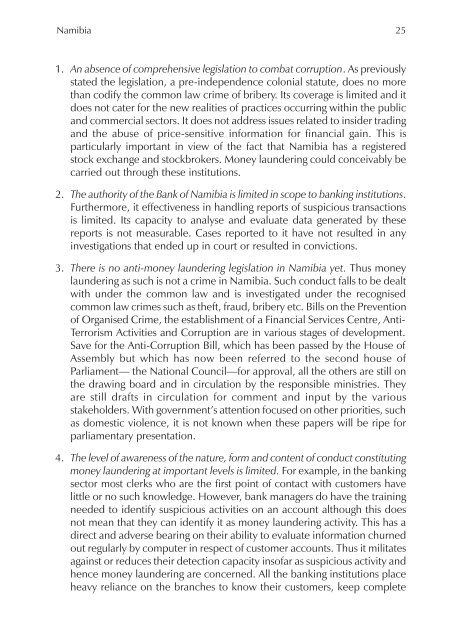Monograph 108 complete download - Institute for Security Studies
Monograph 108 complete download - Institute for Security Studies
Monograph 108 complete download - Institute for Security Studies
Create successful ePaper yourself
Turn your PDF publications into a flip-book with our unique Google optimized e-Paper software.
Namibia<br />
25<br />
1. An absence of comprehensive legislation to combat corruption. As previously<br />
stated the legislation, a pre-independence colonial statute, does no more<br />
than codify the common law crime of bribery. Its coverage is limited and it<br />
does not cater <strong>for</strong> the new realities of practices occurring within the public<br />
and commercial sectors. It does not address issues related to insider trading<br />
and the abuse of price-sensitive in<strong>for</strong>mation <strong>for</strong> financial gain. This is<br />
particularly important in view of the fact that Namibia has a registered<br />
stock exchange and stockbrokers. Money laundering could conceivably be<br />
carried out through these institutions.<br />
2. The authority of the Bank of Namibia is limited in scope to banking institutions.<br />
Furthermore, it effectiveness in handling reports of suspicious transactions<br />
is limited. Its capacity to analyse and evaluate data generated by these<br />
reports is not measurable. Cases reported to it have not resulted in any<br />
investigations that ended up in court or resulted in convictions.<br />
3. There is no anti-money laundering legislation in Namibia yet. Thus money<br />
laundering as such is not a crime in Namibia. Such conduct falls to be dealt<br />
with under the common law and is investigated under the recognised<br />
common law crimes such as theft, fraud, bribery etc. Bills on the Prevention<br />
of Organised Crime, the establishment of a Financial Services Centre, Anti-<br />
Terrorism Activities and Corruption are in various stages of development.<br />
Save <strong>for</strong> the Anti-Corruption Bill, which has been passed by the House of<br />
Assembly but which has now been referred to the second house of<br />
Parliament— the National Council—<strong>for</strong> approval, all the others are still on<br />
the drawing board and in circulation by the responsible ministries. They<br />
are still drafts in circulation <strong>for</strong> comment and input by the various<br />
stakeholders. With government’s attention focused on other priorities, such<br />
as domestic violence, it is not known when these papers will be ripe <strong>for</strong><br />
parliamentary presentation.<br />
4. The level of awareness of the nature, <strong>for</strong>m and content of conduct constituting<br />
money laundering at important levels is limited. For example, in the banking<br />
sector most clerks who are the first point of contact with customers have<br />
little or no such knowledge. However, bank managers do have the training<br />
needed to identify suspicious activities on an account although this does<br />
not mean that they can identify it as money laundering activity. This has a<br />
direct and adverse bearing on their ability to evaluate in<strong>for</strong>mation churned<br />
out regularly by computer in respect of customer accounts. Thus it militates<br />
against or reduces their detection capacity insofar as suspicious activity and<br />
hence money laundering are concerned. All the banking institutions place<br />
heavy reliance on the branches to know their customers, keep <strong>complete</strong>
















